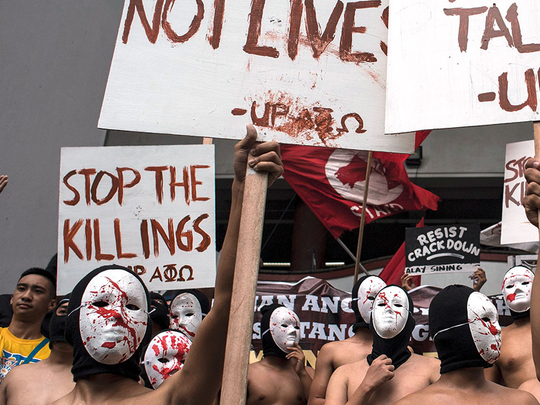
Manila: Seventeen months after President Rodrigo Duterte unleashed his drive against drugs, the government has reported gains never been achieved by similar campaigns in the past.
According to Philippine National Police (PNP) spokesman Senior Supt. Dionardo Carlos — from the time Duterte assumed the presidency on July 1, 2016 to July 26 this year — 1.3 million suspected drug dealers and users have surrendered.
This unprecedented number was achieved as government operatives, comprising mainly PNP personnel, conducted door-to-door crackdowns under the operations dubbed “Plan Tokhang” and “Double Barrel.”
- Dionardo Carlos, Philippine National Police spokesman
But questions about whether the campaign can be sustained abound.
The arrests made things worse in the country’s already overcrowded jails as there were packed with even more people.
According to Senior Inspector Xavier Solda, spokesman of the Bureau of Jail Management and Penology (BJMP), Duterte’s clampdown on drugs has caused jails to exceed their capacity by 623 per cent.
“There were only 98,000 inmates before President Duterte assumed office last year,” he said.
The Duterte campaign against drugs had largely been depicted as brutal.
From July 1, 2016 to September 16, 2017 alone, a of total 3,850 drug suspects died.
Known drug peddlers and users were arrested while others surrendered as they feared becoming fatalities in the campaign.
But not all who died during the campaign were criminals or suspects.
According to the PNP, 289 officials were among those killed in operations carried out by the PNP, National Bureau of Investigation, Armed Forces of the Philippines and the Philippine Drug Enforcement Agency (PDEA).
Support
The government’s anti-drug campaign had largely been vilified in the national press and pilloried in international media.
As criticisms were heaped of the Duterte administration’s unconventional strategies in its drive, people pulse surveys told a different story.
In the September 2017 Nationwide Survey on the Campaign Against Illegal Drugs conducted by Pulse Asia Research Inc, 88 per cent of Filipinos said they supported the campaign against illegal drugs.
The same survey likewise cited observations made by 86 of respondents that anti-drug operations in the village level were orderly, in contrast to the observations by 11 per cent of those polled that police operations were violent.
“We are grateful for this recognition of the efforts of the PNP in the anti-drug campaign, particularly during the 15-month period when we launched Oplan Tokhang and Project: Double Barrel,” Carlos said.
Defeating drug syndicates and cutting the supply of drugs is one of the pillars of the Duterte administration’s “Social Transformation” campaign. The president believes that drugs is a major factor in the commission of crimes.
Since the government launched the drive against banned substances, crime rates have also gone down.
According to the PNP, focused police operations against organised crime groups and street crime gangs led to an 8.44 per cent drop in Total Crime Volume from a high of 493,912 incidents in January-October 2016 down to only 452,204 incidents recorded in January-October 2017.
It is yet to be ascertained if the campaign against drug has something to do with it, but across the country, all regions posted marked decline in Index Crime cases of murder, physical injury, robbery, theft, rape, car theft and cattle-rustling.
The Duterte administration’s anti-drug efforts, although seen as effective by some, had been prone to abuse. There had been a number of cases when suspects were reportedly tortured before killed if not executed outright in public. This caused outrage from various sectors including the Catholic Church which had been increasingly vocal on the issue on top of these are a number of public hearings held in the Senate over the issue of extrajudicial killings and lawman — mainly police officers — who committed excesses were charged in court.
The condemnation against extrajudicial killings forced the Duterte administration to refocus its campaign and return authority over anti-drugs operations to the PDEA as well as enforce tighter guidelines on handling drugs-related arrests.
Gulf News talked to Benjamin Gaspi, PDEA acting Director of Internal Affairs to clarify what changes can be expected concerning the handling of drugs cases.
Gaspi said PDEA, an agency patterned after the United States’ Drug Enforcement Agency (USDEA), is the chief agency handing concerns on anti-narcotic drugs and other controlled precursors and essential chemicals, “however, other law enforcement agencies, e.g. PNP NBI, Bureau of Immigrations and Customs etc are also allowed or authorised to conduct anti-illegal drugs operations with prior coordination from PDEA.”
“President Duterte declared that only PDEA, as the sole and lead agency, has power to conduct anti drug operations. As a general rule no anti-drug operation can be conducted without prior coordination from PDEA,” he emphasises.
The government had been winning the war against drugs, however it remains to be seen whether such success could continue under the new set up.
Gaspi said PDEA would carry on with the momentum of the anti-drugs campaign.












